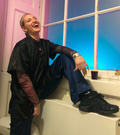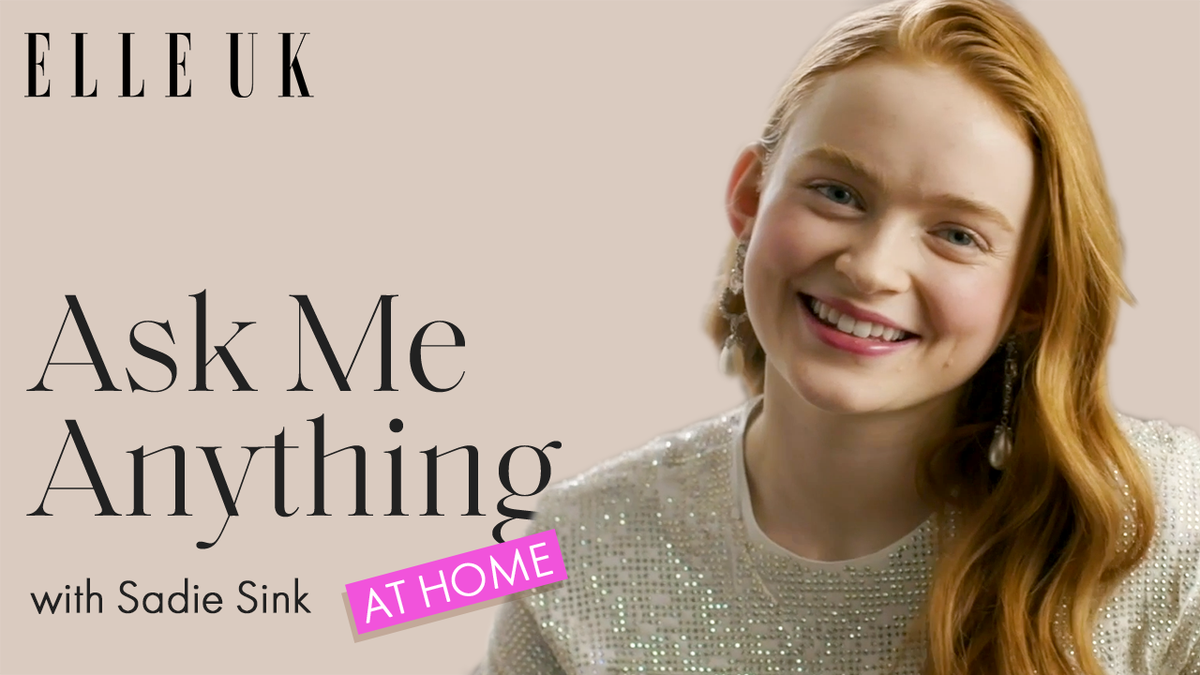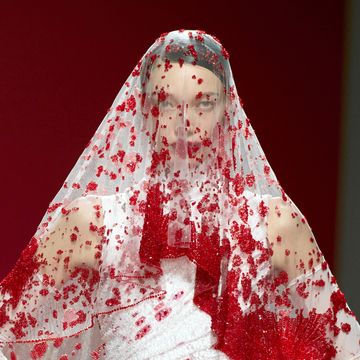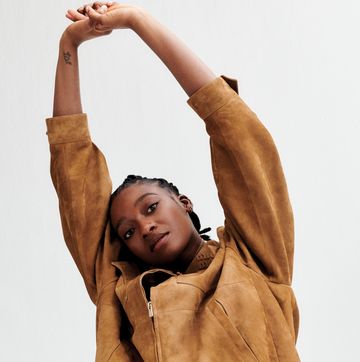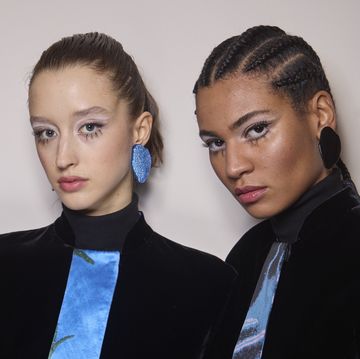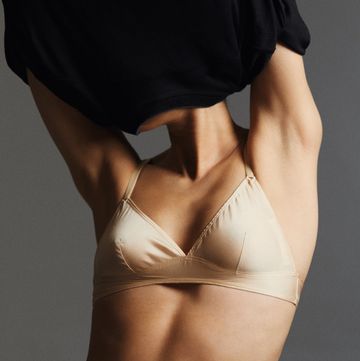‘I don’t think there’s just one way to be happy, or one way to connect with people,’ says Ana Kirova. ‘I’m not trying to prescribe one type of dating. But I want you to question what’s considered the norm and whether it’s working for you.’
She’s speaking as the newly appointed CEO of Feeld – the world’s most progressive dating app – and the woman taking responsibility for bringing a new era of radical sexual honesty to the masses. Championing ethical non-monogamy and the exploration of non-mainstream romantic relationships, the app is for the sexually curious, to put it lightly.
In April, Kirova joined Whitney Wolfe Herd of Bumble and Charly Lester of Lumen as one of the few female leaders in the male-dominated online dating industry. She’s explaining her vision to me over Zoom, from her apartment in Porto, Portugal. She is softly spoken and warm, with a charming Bulgarian accent. Her dark curls are tucked behind one ear and, in a halterneck top, she doesn’t look like the typical tech boss. That’s the point: Kirova is here to do things differently.
She believes the traditional rules for love, sex and relationships – such as deciding on your sexuality and sticking to it, or being committed to one person for life – are outdated, and that we should work from a more ‘evolved’ place of understanding desire when it comes to finding our match(es).
‘As long as you respect the core values, such as consent and mutual respect, nothing else should tell you how you should connect with someone,’ says Kirova. ‘Everything should be based on the happiness and satisfaction of those involved.’
Drastically different to other dating apps, Feeld encourages users to search for connections based on shared sexual desires. Open-mindedness is key. If you’re on Feeld, you’re into (or open to) something different, and typical fields – compulsory profile sections for height and job or the usual conversation prompts – are missing. Instead, there’s a ‘desires’ section in your bio for interests beyond your book club. You can type anything, with common entries being ‘threesomes’, ‘sexting’, ‘dominant’, ‘submissive’, ‘kink’, ‘friendships’, ‘group’ and abbreviations that you may need to google, such as ‘FWB’ (friends with benefits). On a typical (heterosexual) swiping session, you will come across profiles of people who are bi-curious, heteroflexible, polyamorous and single, or polyamorous and in a relationship – even couples with paired profiles, searching for someone who’s up for joining them. For those open to experimentation, it is a sexual utopia.
And Kirova is confident that the demand is there, pointing to research that shows one third of Americans say their ideal relationship is non-monogamous* and that 35% of Gen Z question monogamous relationships.** ‘New generations are more fluid,’ she says. ‘They don’t care so much about being straight or being anything at all. They want to connect and live a life that is full and real.’
As the ‘smart kid’ growing up, Kirova says she didn’t fit the ideal archetype for a Bulgarian woman (‘pretty, slim and long-legged, with huge breasts and straight hair,’ according to her) and her parents ‘groomed’ her to study business or hotel management in Germany. But she changed her mind at the last minute, opting to study graphic design at the University of Greenwich in London. In part, her decision was fuelled by an obsession with cult British TV series Skins, which opened her eyes to the kind of sexual freedom she was lacking in her stifling home country.
‘Simply put, I wanted freedom,’ says Kirova. ‘In Bulgaria, there is no other option than being straight. If you feel arousal for the same sex, it means you have a problem. Growing up, I was petrified I was gay. I distinctly remember writing in my diary aged 16 about the relief of finally being attracted to a boy.’
Kirova met Feeld founder Dimo Trifonov at a party while at university but, two months into their relationship, she started to have feelings for a woman she worked with at her part-time job. It felt deeper than sexual attraction, which troubled Kirova, because that’s how she felt for Trifonov, too.
‘In my head, it was binary. You have one person and that’s it,’ she says. ‘If you have feelings for someone else, then you have to replace [your partner with them]. That’s just how it works.’
She wrote Trifonov a letter she never planned to send, explaining her thoughts as a way to process them, but in the end she couldn’t keep the secret from him. She gave him the letter and expected it to end their relationship.
Instead, he responded with care and warmth, explaining how ridiculous it was to feel so bad about something so normal. He said he’d always feared the pressures of monogamy would break up his relationships and that it seemed unrealistic to expect to get everything you want in life from one person. Also from Bulgaria, Trifonov knew first-hand of the closed-minded attitudes to experimentation, and wanted Kirova to have freedom to explore her sexuality.
They started dating as a couple, but found that none of the existing apps made that particularly easy. In response, Trifonov developed what is now Feeld (originally called 3nder – pronounced ‘thrinder’): an app designed for twosomes to become threesomes, foursomes or moresomes.
Kirova was involved in every kitchen table discussion from the app’s inception, and joined the team as a member of staff in 2016. She went from an untitled coworker in the all-hands-on-deck early days to part-operations-part-communications-part-branding ‘zen master’ (oh, startups) and eventually became chief product officer last year.
Kirova is the reason the app has its most notable feature: more than 20 different sexualities and gender identities, from heteroflexible to ceterosexual (attracted to people who are transgender or non-binary). After reading a customer service email from a trans woman who felt erased by the app’s limited gender options, Kirova realised that to fully facilitate the open-mindedness the app preached, they needed to do better and think bigger.
During Europe’s first lockdown, then-CEO Trifonov decided to step back to focus on innovation and new products. He began to consider who could be most suitable to lead the next phase of growth and nurture the company. It wasn’t just Kirova’s intimate knowledge of the business that made her ideal. It was her unfaltering belief in the app’s higher purpose: that being open and free is what’s going to make us all better people, and the world a happier place.
‘Nothing good ever came from hiding or suppressing a feeling. If anything, it usually makes it bigger and harder to control,’ says Kirova. ‘By encouraging you to explore every feeling, Feeld has the ability to change lives.’
In the past year, one that saw many companies make severe cuts or collapse entirely, Feeld has almost doubled in size. Its success might seem surprising against a backdrop of social distancing rules, but Kirova explains that its appeal lies in more than a facilitation of real-world encounters.
‘As soon as lockdown started, we saw people wanting to find more meaningful connections. They cared even less about where that person was based.’
Instead of browsing potential suitors in the local area, users selected ‘Staying at Home’ to connect with self-isolating humans from around the world, or the ‘Fantasy Bunker’ for small-talk-skipping sexting. There was a 50% increase in downloads in the first half of 2020 and, at times, they saw a 120% increase in sent messages.
‘Seeing organic growth at such a difficult time for the world gave me an intoxicating kick,’ says Kirova. ‘It’s given me even more clarity to get the business to the next level and reach more people. That’s the sort of energy I drive with.’
Given the nature of its business, Feeld has battled misconceptions and prejudice. It took two years to find investors. At one point, money transfer app Wise blocked Feeld’s ability to collect money for paid memberships because they considered it ‘adult content’. Feeld faces fewer barriers after proving it’s not in the adult industry, but the stigma that comes with misunderstanding polyamory lives on.
Feeld exists to challenge these stereotypes. Not only does it help users navigate the nuances and language of non-traditional relationships (polyamory, for example, is about having intimate, loving relationships with multiple people, while an open relationship is where both parties have a desire for sexual relationships outside of the main partnership), the app’s interface is slick and beautifully designed. When you swipe ‘next’, it doesn’t lose the potential suitor into the cancelled ether, it keeps them around so you can go back and make a measured decision. There’s a specific ‘no’ button to stop trigger-happy swiping. And on the brand’s Instagram grid, you won’t find the usual dating memes – rather myth-busting infographics, tips on how to communicate boundaries and educational-inspirational quotes such as, ‘Bondage as a practice is a kind of radical honesty – you have to mean it’.
The company is just as progressive behind the scenes, with the emotional understanding and non-judgemental attitude that Kirova has honed in her own open relationship defining the culture of the company she now leads. The team of 40 full-time staff has been working remotely from all over the world since the app was founded in London. In ‘normal times’, the global team has biannual physical meet-ups where they work and get to know each other through team-building exercises, from hiking to hackathons. The leadership team is 50% female and employees get unlimited holidays, flexible working hours, on-demand therapy and salary transparency.
‘We’ve always considered what a human needs to really do their best work,’ says Kirova. ‘People aren’t machines. These rules about working hours come from a past of physical labour – the knowledge economy just doesn’t allow for that.’
Kirova doesn’t believe you can own someone’s brain for eight hours a day any more than she wants to own a partner’s body exclusively for a lifetime. She thinks, and knows from experience, that what makes people more creative is freedom.
‘And I mean sincere freedom, not mock freedom. We truly want to provide a space for everyone to develop into happy and complete humans, both for the platform’s users and the people who work here.’
When she was offered the top job, Kirova said yes, but not without hesitation. ‘While growing as a leader I’ve had periods of self-doubt, wondering if I’m truly good at this profession or simply close to [Trifonov]. But I’ve reached a point of acceptance,’ she says. Kirova now uses any doubts to fuel her growth by setting objectives that make her feel as though she’s earned it.
‘The truth is, there’s no such thing as being the best person for the job. You become it. I interpreted it as the responsibility to lead in the right direction.’ But dating the (ex) boss isn’t her only reason for reservation. ‘Imposter syndrome haunts women’s entire lives, but I especially felt it coming from a country like Bulgaria, where men are considered competent and women are there to care,’ she says.
Raised in the seaside city of Varna to a neurologist father and mother who managed a broadcasting company, Kirova wasn’t lacking a strong female role model, but she was acutely impacted by the sexist attitudes.
‘My mother is a very powerful woman, but men she worked with always viewed her as being different; an anomaly. She almost had to claim a ‘male’ role.’ For all her evolved thinking in other areas, Kirova still feels burdened by the sexism she encountered in her home country. She’s currently studying for an MBA from Imperial College London, partly to prove to herself, and anyone else doubting her, that she’s worthy of her job title.
Today, only 35% of Feeld users are dating with a partner. Instead, the app has evolved into a new frontier of open-minded singledom, a place where users set the rules.
‘I have found that polyamorous people are more communicative and trustworthy, but I think people often assume the opposite,’ said user Isabel*** on Feeld’s Instagram. Another member said that they felt much more secure meeting people through Feeld because they are more comfortable expressing emotional, social and physical interest. It’s a growing movement. Every month, 700,000 connections are made worldwide, mainly between users aged 26 to 36, and the number of active users has grown by 160% since January 2019.
‘Data shows that fewer people are choosing to get married, or don’t necessarily want to have families in the old-school way. Polycules [a network of connected non-monogamous relationships] and triads [a three-person relationship] are becoming prevalent across the world. The new generation is all about questioning convention,’ says Kirova.
She believes that by being open about desire, always within the principles of respect and consent, people are able to truly connect with someone, rather than project a suppressed desire over them. ‘This reflects my whole way of living,’ she says. ‘If you feel something, explore it. Don’t outright reject it or shrug it off.’
Kirova still defines her relationship with Trifonov as open, though she admits that it’s been more ‘monogam-ish’ of late. ‘Initially we overdid dating other people and it became forced,’ says Kirova. ‘Recently, we’ve put so much passion into Feeld that there just isn’t enough to spare for anyone else, but it’s always an option.’
Kirova’s advice for maintaining a healthy open relationship is communication. ‘At first, we suppressed our jealousy because we were ashamed of it,’ says Kirova. ‘We thought we were this cool couple, and that jealousy had no place with us, but it’s a valid element of any relationship.’ Now they discuss any behaviour that makes the other feel insecure.
The part she loves most about being in an open relationship? Allowing herself to acknowledge an attraction to other people. ‘I used to think admiring others was basically cheating. At parties, I would shut off because I was taken,’ says Kirova. ‘When that wall came down, it felt like a deep breath out. I no longer have to hold myself back.’
For Kirova, her work has been little short of life-changing, and that’s what she wants to offer Feeld users, too. ‘There is a prescriptive idea of what a good couple is and what a good life looks like, and because of that we’ve had to squeeze ourselves into archaic formulas,’ she says. ‘We’ve had to chop our wings off, but there are alternatives. That is why I believe in Feeld so much. It’s the place where you can begin to consider the possibility of change.’
*YouGov America, January 2020. **Feeld, 2021. ***Name has been changed.
This article appears in the August 2021 issue of ELLE UK.
